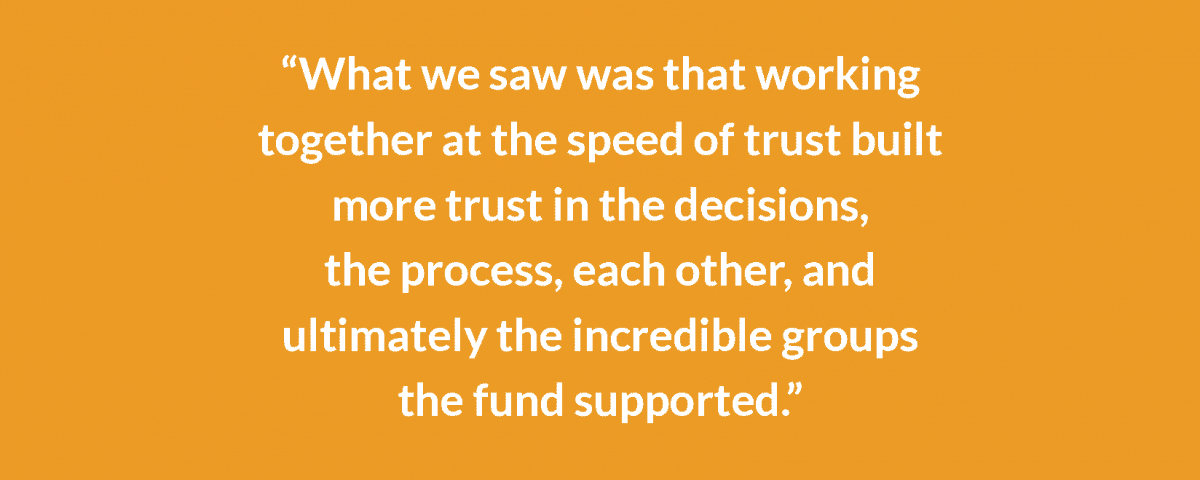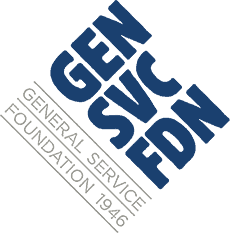
By Pia Infante
January 31, 2018
Last year, The Whitman Institute joined a group of foundations from around the country in a collaborative rapid response fund: Defending the Dream. While we were already doing our own rapid response grantmaking, we knew that teaming up with other funder partners would allow us to work more swiftly and effectively without reinventing the wheel. So we joined Hill-Snowdon Foundation, General Service Foundation, Jessie Smith Noyes Foundation, Hyams Foundation, and other partners to pool our resources to uphold the dream of a thriving, inclusive democracy, and a strong public sector. This cohort of funders had never partnered in grantmaking before, but the urgency of communities being targeted by the Trump Administration fueled our desire to work collectively to support multi-issue, community-based organizing and power-building at the state and national levels.
Now in its second year, with a third RFP cycle coming this spring, the Defending the Dream Fund prioritizes support for groups that tend to be overlooked by larger funders, especially organizations with budgets under $1M and that are located in typically underfunded areas like the South, Midwest, and rural communities.
Collaborative work is never easy — especially when it involves moving funds quickly — but throughout the process, we and our funding partners have been in constant communication, which has allowed us to build a foundation of trust. First and foremost, we invested some time at the front-end to establish clear systems, roles, and processes. Hill-Snowdon provided the facilitative leadership, staffing, and communications infrastructure, Solidaire provided an online portal, and once determinations were made, each participating foundation executed a subset of grants directly so that the fund did not need to create a third fiscal entity. This structure enabled us to move relatively swiftly, using existing staffing, systems, and infrastructures. Ultimately, the second round cohort was determined within about 2 months time, with 31 awards of $10,000 to $25,000 in size totaling nearly half a million dollars.
After two rounds of grants, we and our funding partners have taken the time to collectively reflect on what we’ve learned as we prepare for a third cycle later this year. So far, this collaboration has yielded 8 key lessons:
- Values Brought Us Together, Cross Pollination Made Us Stronger. Our values for racial and economic equity and a thriving, inclusive democracy brought us together across a spectrum of varying organizational mission, strategy, and focus. Our initial motivation was to move money together. We ended up moving money and moving each other’s thinking and practice as well.
- A Streamlined Application Process Was Essential. One abiding core value was our collective commitment to respect non-profit groups’ work, energy, and time — and not wanting them to divert too much attention to a lengthy application process amidst the critical work they steward. This motivated us to partner with Solidaire and utilize their JustFund platform to streamline the grantseeking process. Using this robust, transparent platform also introduced all the applicants to a broader set of potential donors and funders while enabling continuous grantmaking that doesn’t need to wait on the next grant cycle.
- Organizational Anchoring + Flexibility = The Secret Sauce. Part of a flexible collaboration means some people are doing more work than others. There was a fluidity and flexibility of approach and even in determining grant amounts. Not everyone’s participation looked the same but every foundation did participate in a substantive way in determining awards and informing process. Part of what allowed that flexibility was that Hill-Snowdon served as the anchoring organization without which the process would have been much less cohesive and fractured. We appreciate the spirit of service in which Hill-Snowdon bore the brunt of the facilitative work while holding a deeply democratic decision making protocol.
- Collaboration Yields a Different Type of ROI. Again, a collaborative process doesn’t necessarily make for a faster one. And modest grants of $10,000 to $25,000 required more due diligence than some expected. Some questions that surfaced in the post-op were about the time “cost” of collaboration vs. the size of the grants awarded. We agreed in the final debrief that the learning that was cultivated is quite worth the investment of extra time to collaborate.
- Working Together at the Speed of Trust Builds More Trust. The collaborative effort of conducting a round of grantmaking together strengthened our critical thinking and dialogic muscles, while deepening individual and institution relationships. Each institution shared practices in equitable grantmaking that increased the surface area of mutual understanding about each other’s decision making processes in ways that only shared work can.
- We Positively Influenced Each Other’s Grantmaking Processes. Those of us that do streamlined grantmaking influenced those that do open application processes, and vice versa, cross-fertilizing to strengthen hybrid approaches intended to meet grantseekers in more trusting, effective, and equitable ways. For instance, Hill-Snowdon is looking to integrate TWI’s principles of inquiry into their site visits. TWI is using a version of the pivot chart the group used during the review process to map geographic/topic/identity/budget sizes of our rapid response grants to date and look for potential gaps.
- The Open Call Opened Our Eyes and Broadened Our View. While an open call inevitably yielded more applications than grants awarded, it exposed us all to new groups we wouldn’t have come across otherwise. The funders in the collaborative were more deeply apprised on issues that we didn’t normally focus on, and introduced to organizations that we didn’t know, even if we did focus on the issue. The groups supported represent a broad set of issue and regional work, teaching us where there are overlaps and gaps in funding.
- We Inevitably Must Trust the Leadership of Impacted Communities. In the end, Defending the Dream awards have been primarily awarded to groups led by people of color. Given the demographic of communities that are most immediately feeling the direct pain of discrimination, criminalization, and deportation in the Trump era, this outcome was likely but not inevitable without the collaborative’s commitment to prioritizing the leadership and solutions that stem from the communities most impacted.
Funders often encourage grantees to collaborate with each other, and it was humbling to try collaboration on for ourselves. While the process was obviously more clunky between multiple institutions that it might have been had we stayed with conducting all of our rapid response grantmaking individually, it brought unexpected joy and no doubt more lessons to be revealed. Ultimately, what we saw was that working together at the speed of trust built more trust in the decisions, the process, each other, and ultimately the incredible groups the fund supported.
Pia Infante is executive director of The Whitman Institute.
Article posted to The Whitman Institute Blog:
https://thewhitmaninstitute.org/twi-blog/8-lessons-collab-rapid-response/
